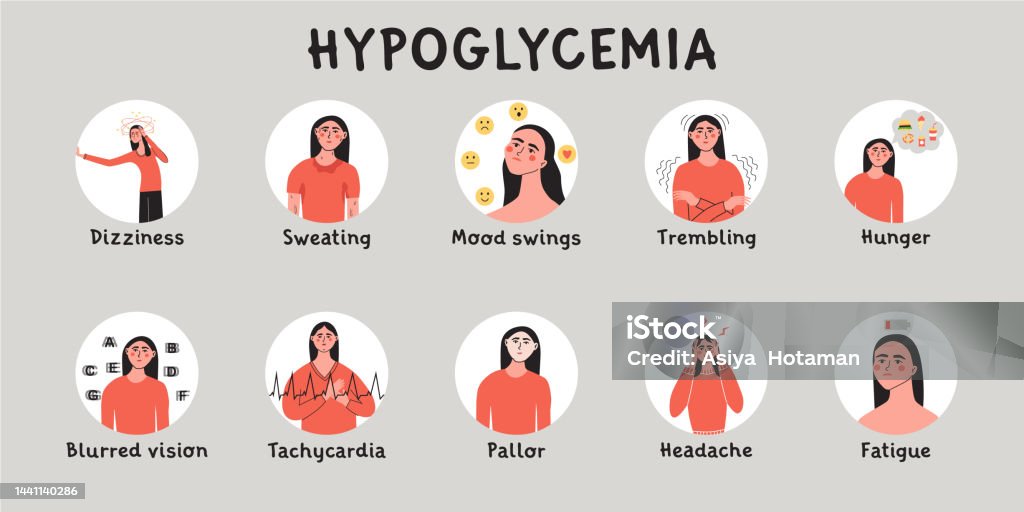Hypoglycemia in Diabetes
The Blood Sugar Dizzy: A Comprehensive Overview of Hypoglycemia in Diabetes
Maintaining blood sugar levels within a reasonable range is a complex balancing act that goes into managing diabetes. Although hyperglycemia, or high blood sugar, receives most of the focus, hypoglycemia, or low blood sugar, is also a worry for those who have diabetes. Let’s explore the causes, symptoms, and practical management approaches of hypoglycemia in diabetes.
Table of Contents

What is Hypoglycemia: A Dip in Blood Sugar?
Hypoglycemia in Diabetes
A “hypo,” or hypoglycemia, is a condition in which blood sugar levels fall below the ideal range. A blood sugar level of less than 70 mg/dL (milligrammes per deciliter) is regarded as hypo for the majority of diabetics.
Why Does That Occur?
Hypoglycemia in Diabetes
Hypoglycemia in diabetics can be caused by a number of factors:
- Too Much Medication: Excessive usage of insulin or specific diabetes drugs might cause a dangerously low blood sugar level.
- Missed or Delayed Meals: Hypoglycemia can result from missing meals or delaying them without modifying insulin dosage or medication.
- Enhanced Physical Activity: While exercise aids in blood sugar regulation, intense exercise in the absence of dietary or medication modifications can result in a dip.
- Drinking Alcohol: Drinking alcohol can cause hypoglycemia by interfering with the liver’s capacity to release glucose into the bloodstream.
The Warning Signs of Hypoglycemia: Identifying the Indications
Hypoglycemia in Diabetes
Not all cases of low blood sugar have overt symptoms. However, early intervention requires knowledge of the following warning signs:
Early Warning Indications:
- Perspiration
- shakiness
- Feelings of hunger
- Anxiety Intolerance
- Heart palpitations
- lightheadedness
- inability to concentrate
Late Indications:
- Hypoglycemia in Diabeteshazy vision
- slurred words
- Perplexity
- Feeling sleepy
- Convulsions
- (In severe instances) Coma
Hypoglycemia in Diabetes
Different People Have Different Symptoms:
Individual differences in the degree and frequency of hypomania can influence the symptoms.
Taking Charge: Handling a Hypoglycemic Incident
Hypoglycemia in Diabetes
Anybody with diabetes has to know how to respond to a hypoglycemic event. This is what you should do:
- Verify your blood sugar level: For verification of low blood sugar, use a glucometer.
- Eat or drink something that contains easily accessible glucose, such as honey, juice, or glucose tablets, to consume quick-acting carbohydrates.
- Give it fifteen minutes: Wait fifteen minutes after taking quick-acting carbohydrates before rechecking your blood sugar. If required, repeat.
- Seek medical attention: Get help right away if your blood sugar level doesn’t improve after 15 minutes or if you have severe symptoms like seizures or confusion.
How to Avoid the Crazy Ride: Strategies to Prevent Hypoglycemia
Hypoglycemia in Diabetes
Although hypoglycemia can happen, the risk can be reduced by doing the following:
Regular blood sugar: monitoring enables you to spot patterns and any dips in your blood sugar levels.
Collaborate with your physician: Talk about your risk factors and, depending on your blood sugar levels and lifestyle choices, modify the dosage of your medicine or insulin as necessary.
Arrange your snacks and meals: Blood sugar levels can be kept stable by eating well-balanced meals and snacks at regular intervals.
Talk to your loved ones: Tell your loved ones about diabetes, hypoglycemia symptoms, and how to treat it.
Carry identification: In the event that you have a severe hypoglycemia and are unable to talk, carry medical identification that identifies you as having diabetes.
Living Confidently: Don’t Allow Low Blood Sugar Stop You
Hypoglycemia in Diabetes
Although hypoglycemia might be frightening, it can be efficiently managed with the right information and planning. You can live a full and active life with diabetes by being aware of the signs and causes, being prepared for an episode, and taking preventive actions.


